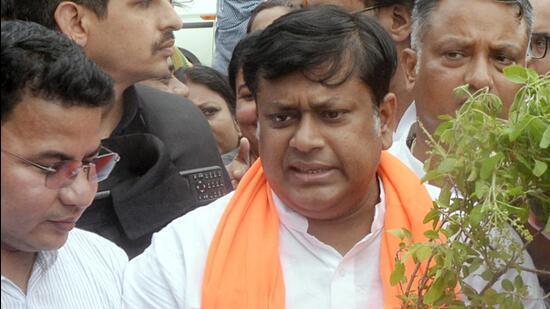
BJP’s Sukanta Compared WB’s Law & Order to Sex Workers: TMC
The Trinamool Congress (TMC) has launched a scathing attack on Union Minister and BJP leader Sukanta Majumder, accusing him of comparing the law and order situation in West Bengal to Sonagachi, one of the largest red-light districts in Kolkata. The TMC party has condemned Sukanta’s comments, labeling them as hate-fuelled and misogynistic.
The controversy began when Sukanta Majumder, a Union Minister of State for Petroleum and Natural Gas, made the remarks during a public rally in Kolkata. The BJP leader claimed that the law and order situation in West Bengal was similar to that of Sonagachi, where sex workers operate openly. However, the TMC party has strongly refuted Sukanta’s comments, calling them an insult to the people of West Bengal.
TMC’s criticism of Sukanta’s comments is not without merit. By comparing the law and order situation in West Bengal to Sonagachi, Sukanta has effectively reduced the dignity of women involved in the sex trade to mere objects of comparison. This kind of language is not only offensive but also perpetuates harmful stereotypes about women and the sex trade.
The TMC party has also accused Sukanta of having a “hate-fuelled mindset” that sees women as objects of abuse and insult. The party’s criticism is not limited to Sukanta’s comments alone but also highlights the BJP’s long-standing record of disrespecting women and marginalized communities.
Sonagachi, the red-light district in Kolkata, is home to thousands of sex workers who toil in inhumane conditions. The area is notorious for its lack of basic amenities, poor sanitation, and rampant exploitation. By comparing the law and order situation in West Bengal to Sonagachi, Sukanta has effectively reduced the complexity of the issue to a simple analogy.
The comparison is also problematic because it ignores the underlying social and economic issues that drive women to the sex trade. Poverty, lack of education, and gender inequality are some of the key factors that contribute to the prevalence of sex work in Sonagachi. By reducing the issue to a simple analogy, Sukanta has failed to acknowledge the systemic problems that need to be addressed.
The TMC party’s criticism of Sukanta’s comments has also highlighted the BJP’s record of disrespecting women and marginalized communities. The party has been accused of promoting a divisive and hate-filled rhetoric that has contributed to the rise of communal tensions in the country.
In recent years, the BJP has been embroiled in a number of controversies related to women’s rights and gender equality. From the Kathua rape case to the Unnao rape case, the party has been criticized for its handling of these cases and its refusal to take a strong stance against gender-based violence.
The TMC party’s criticism of Sukanta’s comments is a timely reminder of the need for politicians to be mindful of their language and its impact on society. Politicians have a responsibility to use their platform to promote respect, dignity, and equality for all citizens, regardless of their gender, religion, or socioeconomic background.
In conclusion, Sukanta Majumder’s comments comparing the law and order situation in West Bengal to Sonagachi sex workers are not only offensive but also perpetuate harmful stereotypes about women and the sex trade. The TMC party’s criticism of Sukanta’s comments is a timely reminder of the need for politicians to be mindful of their language and its impact on society. It is essential for politicians to promote respect, dignity, and equality for all citizens, regardless of their gender, religion, or socioeconomic background.






